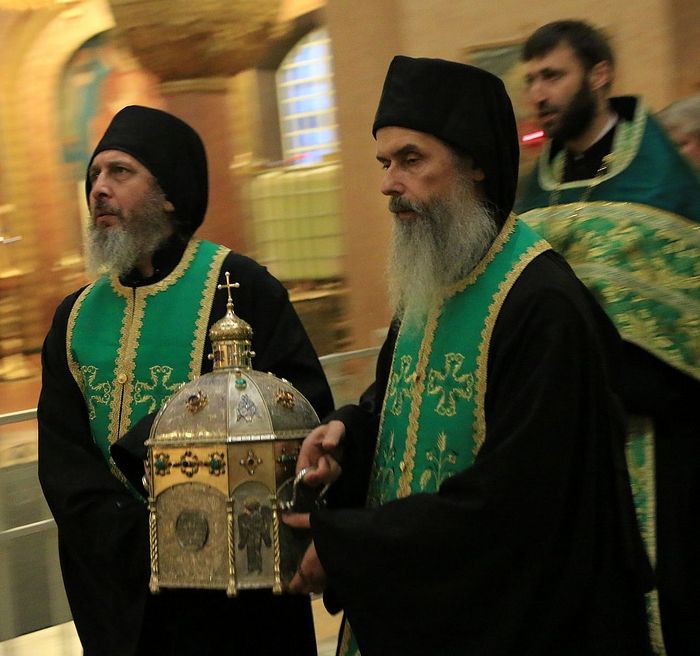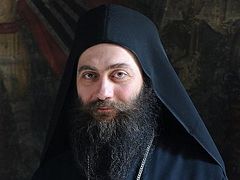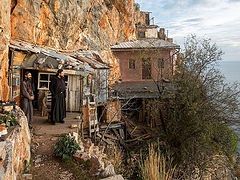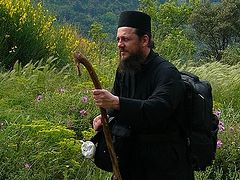On the second Sunday after Pentecost, the Synaxis of All the Holy and God-Bearing Fathers who shone forth on Holy Mount Athos, we talked with Hieromonk Kirion (Olkhovik), Antiprosopos (representative at the Holy Kinot) of the Russian St. Panteleimon’s Monastery on Mt. Athos.
The Lord visibly demonstrates what the consequences of sin are
 Hieromonk Kirion (Olkhovik) —Fr. Kirion, can we live with Christ?
Hieromonk Kirion (Olkhovik) —Fr. Kirion, can we live with Christ?
—Now the Church is not silent: It teaches, preaches and speaks about this openly. Everything is available today. You just need to listen and heed these words. Not everybody listens, though.
—How should we learn to listen to Christ?
—There are many impediments. Even those who are active in Church life are distracted by the habit of being in the know of the latest news. Today people have got plenty of everything, but they forget God.
In order to correct this orientation in life, which is suicidal for eternity, the Lord sends us sorrows: some fall sick, others begin to have family conflicts. There are also serious disasters at a national level. Why? Because the majority have accepted and legalized false values—like abortions. Then God, wishing to correct the whole of society, allows certain global disasters, crises, and wars so that people can start thinking seriously and come to their senses. Quite simply, the Lord visibly demonstrates what the consequences of sin really are.
—There are the following words in the amazing book, War and the Bible, by St. Nicholas (Velimirovich): “A nation that has fallen away from the One Living God becomes in essence a dead nation. Its soul, like a shadow, trembles in the world, like an oak that has been hacked at the roots but still not felled. Earthquakes, flooding, pestilence or war are needed to blow away this shadow, to cut down the hacked tree, to bury the dead. Because falling away from the One God means fighting against Him and trampling on the whole of His Law.”
—People can repent and thus avoid many problems. Then the Lord blesses them with peace in their lives. This can be found both in the Old Testament and in the Gospel. Do you want to live in peace? Do you want your fields to produce crops? Do you want to protect yourself from enemy attacks? Then you must fulfil the law—the Bible prescribes all you need to do.
—St. Nikolai collected many such citations.
—Yes. If we forget this, God sends us the plagues. If our faith ebbs away, the Lord allows trials in order to rekindle it. The Almighty does not want us to be tormented in eternity. And He wants us to avoid suffering in this life on earth as well. He made us for joy. It is we who choose a pernicious path, so that God has to take hard measures to save us.
Training of the spirit
—When do people really live?
—When they live according to God’s plan—that is, when they are genuine human beings. Otherwise, if they have “spiritual atrophy”, if they are enslaved by carnal passions, then they are like speaking animals. Such people are even unable to control their own instincts.
The same thing happens to the body as well: if the body is not nourished and not trained, it becomes weak and ailing…
—There are also sins—“wounds”, along with mortal sins—“injuries incompatible with life”…
—In the Church sacraments the Lord can even revive dead souls.
—How can we nourish and train our spirit?
—We are at the beginning of the Apostle’s Fast—just a right time to remember the spirit. The spirit is nurtured by reading the Holy Scriptures, thinking of God, praying, taking Communion of the Holy Body and Blood of Christ, instructions of the Holy Fathers, and good thoughts. It is trained by abstinence, participation in church services and sacraments, and keeping the commandments of Christ. Give thanks to God as often as possible. Implore Him to give you strength and purity. These are the basics of spiritual life.
Just as in nature a human infant is the most helpless being unless it is cared for, so too in spiritual life…
—A father-confessor is needed, right?
—Definitely. As St. Paul said: And I, brethren, could not speak unto you as unto spiritual, but as unto carnal, even as unto babes in Christ. I have fed you with milk, and not with meat: for hitherto ye were not able to bear it, neither yet now are ye able (1 Cor. 3:1-2). Likewise, neither children nor adult neophytes are supposed to take heavy burdens on themselves.
Little by little, while taking advice from more experienced people, you should readjust your inner self to a spiritual mode: train yourself to attend church, abstaining from idle chatter and entertainment, and find time for a prayer rule. After a time, if you show persistence, all of this will become a vital need for you: if you skip your prayer rule once, you will be as hungry as if you haven’t had either breakfast or dinner. Because your spirit is already alive…
Thus, the life of the spirit which is called to everlasting life truly becomes more real than that of our physical body, which is doomed to die.
And fasts are the best period to attune to this attentive, self-disciplined inner life. You can counsel with your spiritual father and receive his blessing to read some kind of spiritual literature which is in tune with your inner state for the period of the fast. And patristic works will fill both your mind and heart with absolutely new meanings and thoughts in the spirit of the Gospel.
We will lose Orthodoxy without fasting
—How do we become God’s children? After all, our spiritual fathers guide us to Christ and not to themselves.
—As you integrate into Church life you gradually feel the work of the Holy Spirit, which begins to transform your spirit, enlighten your mind, purify your heart, subdue your willfulness, and suppress and control your passions. “You cannot have God for your Father if you do not have the Church for your mother” [the words of St. Cyprian of Carthage.—Trans.].
Divine grace will never violate your freedom. Christ said to the Jews who rejected Him: Ye are of your father the devil (Jn. 8:44). It was they who chose a murderer from the beginning (ibid.) as their father and were born in his spirit.
Howbeit this kind goeth not out but by prayer and fasting (Mt. 17:21)—this is what the Lord said about deliverance from the evil spirit of satan.
Fasting is the key to spiritual life. By abandoning fasting the Protestants [and Catholics] are moving away from the message of the Gospel ever further. Fasting is self-tuning to a right spiritual mode, an opportunity to pull yourself up, and to overcome slackness which is incompatible with prayer.
—“To relax” is one of the most commonly used verbs among contemporary young people. “To stay relaxed?!—God forbid!”—our pastors and missionaries try to bring these people to their senses. We can see a substitution of concepts in today’s mass culture which is imposing destructive things on us as if they were a “desired goal”. Abortion is no longer considered murder; rather, it is part of the “childfree conception”. Freedom is something good in everybody’s consciousness, and the “positive” freedom from children is being imposed. But this is deception and self-destruction.
—Without prayer and fasting we are powerless to withstand the pervasive apostasy, the general departure from the Gospel ideal, which will ultimately lead to the enthronement of the antichrist. Even in some Local Orthodox Churches, which prefer to reform and simplify whatever is possible, the faithful are becoming spiritually weak—The salt have lost his savor (Mt. 5:13)… We must uphold our Orthodox fasting rules. We will lose Orthodoxy without fasting.
Now Russian people have become so lukewarm! They must overcome lukewarmness. There is no more “spark of faith” that we saw at the time of the revival of Church life in Russia after the fall of the Soviet regime. When the Iron Curtain was lifted, a lot of things became accessible, and the Church was not persecuted anymore.
The spirit of faith flares up on the cross
 With Schema-Archimandrite Jeremiah (Alekhin) —How not to quench the spirit (cf. 1 Thess. 5:19)?
With Schema-Archimandrite Jeremiah (Alekhin) —How not to quench the spirit (cf. 1 Thess. 5:19)?
—Through obeying your spiritual father. Genuine prayer is only possible when there is obedience. For prayer is the heart of our spiritual life—it is through communion with God that we attain our goal—that is, theosis.
Do you know what Elder Paisios used to say about prayer?
“We should pray unceasingly and should not be despondent. The more frequently we turn to God the more confidence and joy we have. When I served in the army, it was a troubled time of war. I served as a radio operator and noticed that we only felt secure when we contacted the center of the division on an hourly basis. When our contacts were limited to every two hours we felt a little insecure. When at times we were in touch with them only twice a day—in the morning and in the evening—then we felt uneasy and anxious that we were isolated and cut off from our main forces. This applies to our prayer—the more we pray the more secure we feel within ourselves.”
We must be faithful members of the Orthodox Church, kindle the spirit of fear of God, and perform our Christian duties set forth in the commandments of Christ. The slackness that currently seizes people is the worst thing. Tribulations may begin. The spirit of faith is ignited on the cross.
—How can we not neglect the cross given to us in everyday life? Christians should not wait for some “historic occasion” to start bearing the cross, should they?
—Each of us bears his cross in his life and he must fulfil the mission the Lord has entrusted him with. It is very important for the Christian to discern God’s will for him, otherwise he will waste time in vain. The apostle says: Redeeming the time, because the days are evil (Eph. 5:16). We need to do the things that are of paramount importance and not squander our gifts on trifles.
—What makes the monastic cross unique?
—Before joining a monastery every monk takes vows which he will keep in God’s and the brethren’s presence. “A life of fasting” is one of the most desired lifestyles for monks. The mission of monks, not least the monks of Mt. Athos, is the following: We feel this obligation entrusted to us by the Church, that prayer and propitiation to the Lord should not stop in the world for a single moment. If this happens, the end will come. “It is through monastic prayer that the world still exists,” St. Silouan the Athonite used to say.
Church services are the source of sanctification
—How do monks on Mt. Athos pray?
—On Mt. Athos, prayer is mainly performed at night—when people in the world go to sleep, monks “keep watch”. The daily common prayer lasts eight to ten hours; on the night before feasts, when the Vigil is celebrated, prayer lasts longer. Plus, there is private prayer, along with the Jesus Prayer which is repeated during the day while monks are performing their obediences.
 (During the visit of the venerable head of St. Silouan the Athonite to Russia
(During the visit of the venerable head of St. Silouan the Athonite to Russia
In the 1980s, when it became possible to invite some monks from the USSR to join the brethren of the Russian St. Panteleimon’s Monastery on Mt. Athos, the question of reintroducing the old rule, written by the elders Ieronim (Solomentsov) and Makary (Sushkin), arose. Our abbot, Fr. Jeremiah (Alekhin), wanted to bring it into line with general spiritual traditions of Mt. Athos. We, the younger monks, were keen on the Greek experience at that time…
But Elder Paisios, though he was Greek, reproached us:
“The Russian monastery has its own traditions,” he said. “Take care to revive them. Those traditions produced Elder Silouan; his writings are a complete doctrine of salvation, and this is your heritage, this is the experience of several generations of the fathers of St. Panteleimon’s Monastery, adopted and expounded by a simple monk, who is now venerated by the whole of Mt. Athos.”
Fr. Paisios emphasized that the spiritual podvig of his spiritual father, Elder Tikhon (Golenkov), would have been impossible in the Greek environment because he was noted for his remarkable love for church services. Services were the source of sanctification for him. And this is above all a distinctive characteristic of Russian ascetics, as the elder noted. “In other Athonite monasteries you will hardly find the attitude towards church services comparable to that in the Russian monastery,” he would say.
 Elder Tikhon (Golenkov) in the center, with St. Paisios in the background—he is taking water from a cask to offer to the guests. 1966.
Elder Tikhon (Golenkov) in the center, with St. Paisios in the background—he is taking water from a cask to offer to the guests. 1966.
—We recently published a talk with Archbishop Agapit (Gorachek) of Stuttgart on the special veneration of saints in the Orthodox Church, which is reflected in our services. I recall that Igumen Peter (Pigol) recounted how once Elder Paisios, having heard complaints about the problems encountered in restoring the Athonite Metochion in Moscow, asked how many altars they had there and then patted him on the shoulder, saying: “The saints are not sleeping, they are praying for us!”
—And all the problems have been solved.
—Fr. Kirion, how did you become a monk?
—It is a call from God. Each of us must hear this call, respond to it, and not extinguish the flame that was sent into his heart. This was the case with me, too.
—And how did you end up on Mt. Athos?
—It was the call of God and the Mother of God as well. She calls to Holy Mount Athos whoever She likes. Some remain there, others cannot get accustomed to the place and leave. You have to follow the strict Athonite rule. The fight with thoughts is very intensive there—you will not be able resist them unless you reveal them to your spiritual father all the time.
—How can we not be deterred by the difficulties and not flee our Golgotha?
—For this we should remember that the sacrifice of the cross is always followed by the resurrection in the lives of Christians. Everything is interconnected. These two events should be seen as a unity. This is a distinctive feature of Orthodox teaching. Golgotha is followed by the resurrection, but there is no resurrection without Golgotha.




